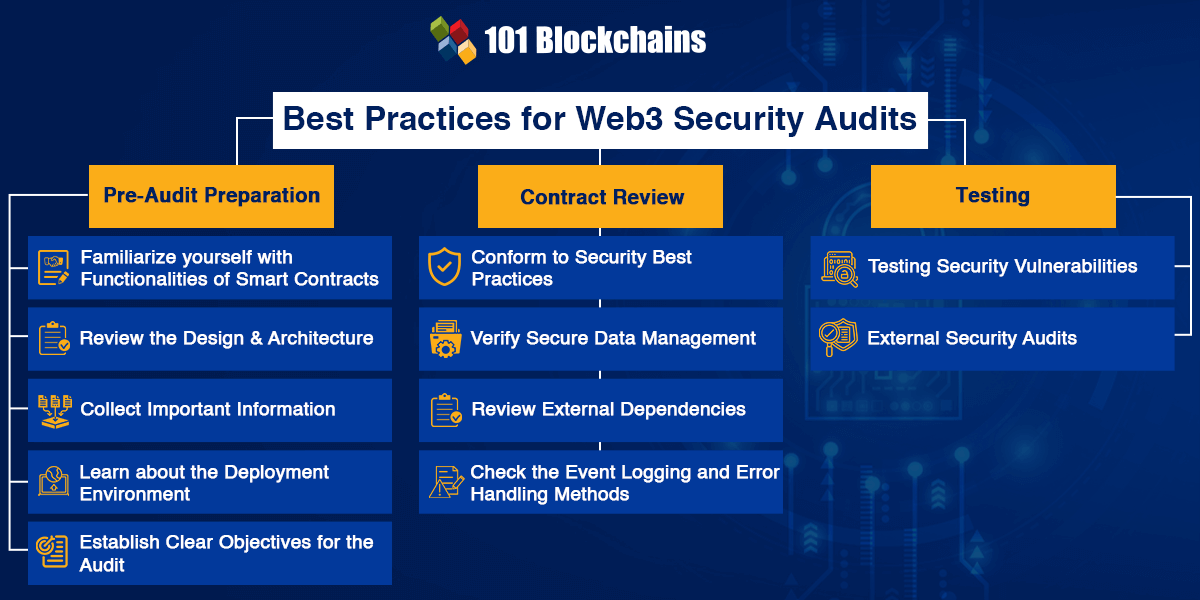The Essential Role of Web3 Security Audits


Unlike traditional financial systems, Web3 relies on smart contracts, blockchain networks, and open-source code, all susceptible to vulnerabilities that can lead to devastating losses for users. This is where Web3 security audits emerge as a critical line of defense, playing an essential role in building trust and securing the future of Web3.
Why Web3 Security Audits are Crucial
While bug bounties and internal testing offer valuable safeguards, they often fall short in identifying complex vulnerabilities and systemic weaknesses. Web3 security audits, conducted by independent experts, offer a comprehensive and in-depth analysis of a project’s code, infrastructure, and security practices.


These audits employ rigorous methodologies, incorporating static code analysis, dynamic testing, and penetration testing to uncover potential vulnerabilities like logic flaws, reentrancy attacks, and access control issues. By proactively identifying these weaknesses before deployment, audits mitigate the risk of exploits, protect user funds, and safeguard the overall integrity of the Web3 project.
The Scope of Web3 Security Audits
Web3 security audits go beyond the confines of smart contracts. A holistic approach encompasses the entire ecosystem, including:
📑 Smart contracts: The core focus of audits, scrutinizing logic, access control, and potential vulnerabilities that could lead to loss of funds.
🏗️ Network infrastructure: Assessing the security of blockchain nodes, consensus mechanisms, and potential vulnerabilities within the network itself.
🧩 APIs and external integrations: Evaluating the security of APIs used by the project and any external integrations that could introduce vulnerabilities.
👨🏻💻 Front-end applications: Examining user interfaces and web applications for potential security flaws that could be exploited by attackers.
🔮 Oracles: These bridges between the blockchain and the real world introduce trust assumptions and potential attack vectors that require careful review.
🪙 Token economics: Audits may analyze the tokenomics model to identify potential issues like manipulation, inflation, or unfair distribution.
By taking a comprehensive approach, audits ensure that vulnerabilities are not masked by siloed assessments, creating a robust and secure foundation for the entire Web3 project.
The Impact of Audits on User Adoption
In a decentralized world where trust is paramount, security audits play a crucial role in attracting and retaining users. A well-conducted audit, publicly available with a detailed report, demonstrates transparency and commitment to user security. This transparency instills confidence in potential users, encouraging them to participate in the project and contribute to its growth. Security audits play a crucial role in fostering trust and encouraging wider adoption by:
🔎 Providing Transparency and Assurance: Publicly available audit reports offer users a transparent view of the security measures taken by the dApp team, building confidence and trust in the project’s integrity.
🛡️ Minimizing Risk and Protecting Assets: Identifying and remediating vulnerabilities before attackers exploit them helps safeguard user funds and assets, mitigating financial losses and fostering a safer environment.
🏦 Attracting Institutional Investors: The presence of a reputable security audit can attract institutional investors who are often more risk-averse and require a higher level of assurance before investing in Web3 projects.
By addressing security concerns and providing peace of mind, Web3 security audits contribute significantly to the overall health and sustainability of the decentralized ecosystem.
The Role of Professional Audit Firms
Web3 security audits demand expertise in blockchain technology, smart contract development, and security best practices. Professional audit firms, with their teams of experienced security researchers and blockchain specialists, are well-equipped to provide comprehensive and reliable assessments.
| Firm | Strengths | Experience | Notable Clients |
| ConsenSys Diligence | Extensive blockchain expertise, comprehensive audit methodology, global presence | 5+ years, audited 1000+ smart contracts | Aave, MakerDAO, Chainlink |
| Trail of Bits | Security research leaders, innovative tools and techniques, focus on proactive security | 10+ years, pioneers in Web3 security | Compound, SushiSwap, OpenSea |
| Quantstamp | Established reputation, focus on smart contract security, rigorous audit process | 7+ years, audited major DeFi protocols | Uniswap, The Graph, yearn.finance |
| CertiK | Formal verification expertise, AI-powered tools, focus on DeFi and NFT security | 4+ years, audited leading crypto exchanges | Binance, FTX, Crypto.com |
| OpenZeppelin | Security-focused development tools, experienced team, active community involvement | 10+ years, audited major blockchain projects | Polygon, Solana, Avalanche |
| Nomic Labs | Focus on smart contract security and infrastructure, innovative tools and research | 3+ years, audited leading DAOs | Yearn Finance, OlympusDAO, BadgerDAO |
| Peckshield | Focus on DeFi and NFT security, strong research team, active participation in security communities | 5+ years, audited popular blockchain games | Axie Infinity, The Sandbox, Decentraland |
These firms employ standardized methodologies, leverage cutting-edge tools, and adhere to strict ethical codes to ensure the integrity and impartiality of their audits. Choosing a reputable firm with a proven track record adds credibility to the audit report and further enhances user trust.
The Future of Web3 Security: Emerging Trends and Innovations
As the Web3 ecosystem evolves, so too must the security landscape. Emerging trends and innovations are shaping the future of Web3 security audits:
🦾 AI-powered tools: Machine learning algorithms can analyze vast amounts of code and identify patterns indicative of vulnerabilities, improving the efficiency and accuracy of audits.
✅ Formal verification: Mathematical techniques can formally prove the correctness of smart contracts, offering a more rigorous approach to security validation.
🕵🏻 Continuous monitoring: Security audits are increasingly becoming iterative processes, with ongoing monitoring and assessments to identify and address emerging threats.
By embracing these advancements, Web3 security audits can continue to evolve, ensuring a safer and more trustworthy environment for users and projects alike.
Conclusion
Web3 security audits are not just a checkbox exercise; they are an essential cornerstone of building a secure and sustainable Web3 ecosystem. By proactively identifying and mitigating vulnerabilities, audits safeguard user funds, foster trust, and pave the way for wider adoption. As the Web3 landscape continues to evolve, so too will the need for robust and innovative security solutions. By embracing these advancements, we can ensure a future where Web3 thrives on the foundation of trust and security.




